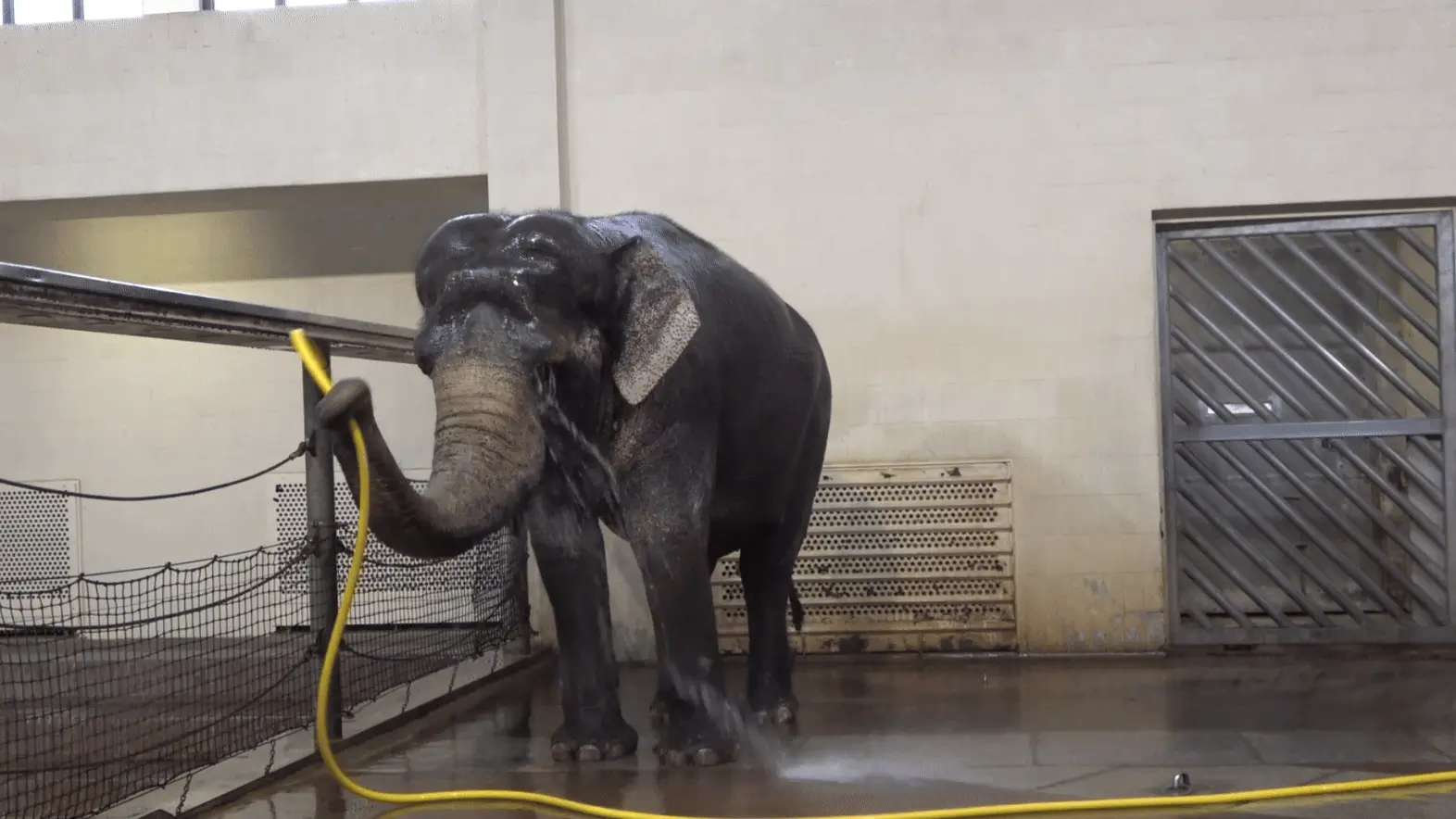These Elephants Can Use Hoses to Shower—and Even ‘Sabotage’ Each Other, Study Suggests
Mary, a 54-year-old Asian elephant at the Berlin Zoo, is the “queen of showering,” but her companion Anchali seems to have figured out how to exploit that habit to play pranks

Elephants are highly intelligent, social creatures capable of peeling bananas, burying and mourning their dead, solving problems and greeting their companions.
Now, scientists have added another skill to this list: using hoses to keep themselves clean—and, possibly, to play pranks on each other. Researchers describe these behaviors in a new paper published last week in the journal Current Biology.
“I am convinced that elephants—and possibly lots of animals—do all sorts of interesting things that we often miss, or dismiss as one-offs or anecdotes,” says Lucy Bates, a behavioral ecologist at the University of Portsmouth in England who was not involved with the research, to Science’s Sara Reardon.
A 54-year-old Asian elephant named Mary at the Berlin Zoo surprised researchers with her adeptness at not only using the hose, but also adjusting her use to serve different purposes.
Mary, who was born in the wild and had lived at other zoos, cleverly used her trunk to manipulate a hose to shower herself with water. She adopted various techniques to shower different parts of her body, including a lasso-like motion that allowed her to reach her back. Mary also changed her grip on the hose to reach various body parts, and she would raise one of her back legs so she could shower it.
Researchers also presented Mary with hoses of different sizes to observe her reactions. She preferred the zoo’s standard-sized hose over smaller or larger ones, probably because the other sizes were more difficult to grab and move with her trunk.
“Mary is the queen of showering,” says study co-author Michael Brecht, a computational neuroscientist at Humboldt University of Berlin, in a statement.
But another Asian elephant, 12-year-old Anchali, appeared to understand how to use the hose to play tricks on Mary. When Mary was showering herself, Anchali would often squeeze, clamp and stand on the hose, thus interrupting the water flow.
Researchers suggest Anchali’s behaviors could have been purposeful attempts to “sabotage” Mary’s shower time, they write in the paper. Over time, she got better at kinking the hose—and she did it more often. The younger elephant also developed a new behavior, which the team calls a trunk stand, that involves leaning into her trunk to flatten the hose.
Anchali may have just been messing around playfully. But it’s also possible she was acting out of spite, because Mary periodically acted aggressively toward Anchali, per the researchers.
“It’s something we would really like to know—does she think it’s funny?” Brecht tells the Guardian’s Nicola Davis. “I think it’s very funny, but we really don’t know. Maybe she’s just trying to be mean.”
Researchers couldn’t prove Anchali’s antics were vengeful—in another experiment, they found that she most often interacted with the hose closest to her, rather than the one Mary was using. But they note it’s not clear whether Anchali could tell which hose went to Mary.
/https://tf-cmsv2-smithsonianmag-media.s3.amazonaws.com/filer_public/28/a7/28a71d95-5290-47b7-a004-1c8b0a9f098d/fx1_lrg.jpg)
The captive Asian elephants (Elephas maximus) also exhibited “highly lateralized” behaviors when handling the hoses, meaning they showered one side of their bodies more frequently than the other. These preferences seemed to align with the elephant’s “trunkedness,” or whether they were right-trunked or left-trunked (similar to right-handedness and left-handedness in humans). For instance, Mary is left-trunked and spent more time using the hose to shower the left side of her body than the right side.
Mary’s “elegant and elaborate” use of the hose for showering isn’t all that surprising, given her physiology, the researchers write in the paper. They suspect that she might have “a somewhat intuitive understanding for a hose, because it’s super similar to the trunk,” says study co-author Lena Kaufmann, also a neuroscientist at Humboldt University of Berlin, to the New York Times’ Emily Anthes.
Still, Mary’s behavior is yet another example of non-human animals using tools, along with cockatoos, macaques, crows, dolphins and others. Scientists have deemed hoses “complex” tools because of their length and flexibility, and because of the dynamics of flowing water.
“I had not thought about hoses as tools much before, but what came out from [this research] is that elephants have an exquisite understanding of these tools,” Brecht says in the statement.
/https://tf-cmsv2-smithsonianmag-media.s3.amazonaws.com/accounts/headshot/SarahKuta.png)


/https://tf-cmsv2-smithsonianmag-media.s3.amazonaws.com/accounts/headshot/SarahKuta.png)